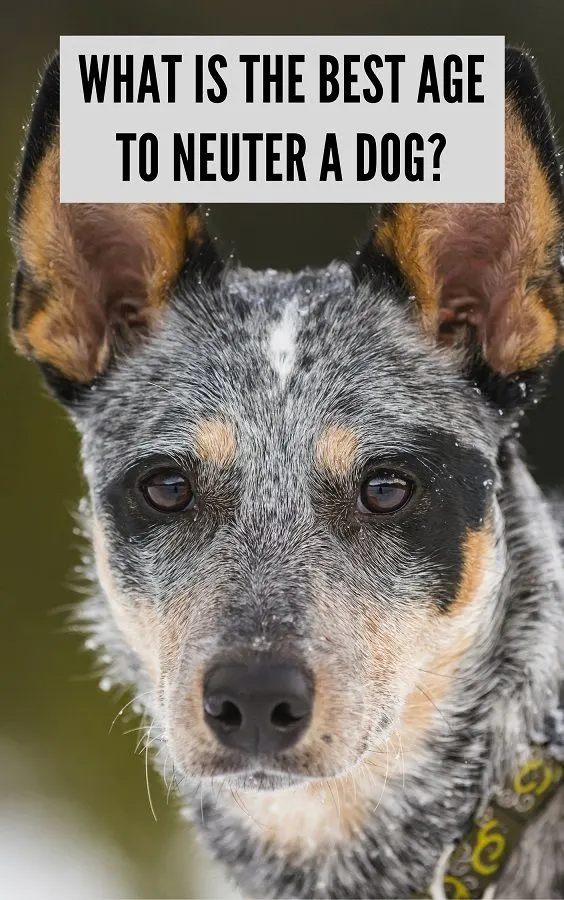When is the best age to neuter a dog? It depends on the dog.
When to spay or neuter a dog is a personal choice between the dog’s owners and the dog’s vet (and sometimes a contract with a breeder or shelter).
There are pros and cons to spaying or neutering a puppy or dog of any age.
When I purchased my weimaraner puppy from a breeder I agreed under contract to have him neutered by 14 months, and that was OK with me.
Remy is 10.5 months now and I had him neutered on Monday. I thought it would be helpful for others to hear about my decision, and please feel free to share your own examples in the comments.
When is the best age to neuter a dog or puppy?
Personally, I wanted to wait as long as possible before neutering Remy because the newest research says it’s healthier for most dogs to remain intact as long as possible, ideally their whole lives. I’m thankful our vet keeps up to date with the latest research and he actually encouraged me not to neuter Remy at all.

With a larger breed like Remy, my main concern was the direct relation between early neutering and increasing the dog’s risk for joint problems and bone cancer down the road.
Since my dog will be very active as my running partner and potential agility dog, I took this seriously.
I’ve already written well-researched posts on the pros and cons of spaying and neutering dogs. You can read those here:
Pros and cons of spaying and neutering a dog
Are rescue groups neutering puppies too young? Yes!
Health benefits of spaying and neutering:
- For females, a spay surgery removes her uterus and ovaries, eliminating her risk of ovarian cancer, eliminating her risk of an infected uterus (pyometra) and reducing her risk of breast cancer.
- For the males, remove the balls and you eliminate the risk of testicular cancer.
Health risks of spaying and neutering:
(This is just a short sampling. Read my full post with references here.)
- Spayed and neutered large-breed dogs are more likely to develop bone cancer
- Spayed and neutered dogs are more likely to develop hip dysplasia
- They’re more likely to tear their ACLs
- More likely to have adverse reactions to vaccines
- Spayed females are more likely than intact females to have urinary incontinence.
It doesn’t take a doctor to figure out that hormone-producing organs affect many areas of the body beyond reproduction.
OK, but what about behavior?
My readers outside of the U.S. are shaking their heads now.
In so many countries, people generally do not spay and neuter their dogs and the dogs do not have behavioral issues. At least, not any more so than spayed and neutered dogs.
Do you notice that when a neutered dog is aggressive, his behavior is blamed on either the owner or a lack of training?
But when an intact dog is aggressive, his behavior is blamed on the fact that he has balls?
With my dog Remy, I would’ve neutered him sooner had I noticed any obvious behavioral issues.
We have not had any trouble at all with:
These behaviors can generally be managed with training, socialization and controlling the environment, but every dog is different. I do think spaying/neutering can at least help with managing certain behaviors. But it’s not a magic fix.
With Remy, he unfortunately does try to hump ME on occasion when he’s excited, and he’s very “up close and personal” with sniffing people and dogs. He also humps Ace’s dog bed.
Rude.
I do hope these behaviors will decrease at least a little now that he’s neutered, but I’m not counting on it. Update: Neutering did seem to stop this behavior, but he stopped a year or so later, I think due to being more mature in general.

Other factors in my decision:
By now I hope it’s obvious there is no best age to neuter a dog or puppy. So much depends on the individual dog.
Here were some additional factors for me:
Cultural issue
In the United States, there are stereotypes against intact male dogs and they are generally not allowed legally in dog parks, off-leash dog beaches, dog daycares, etc. I board my dogs and I want Remy to be able to play in the dog daycare groups.
Aggression from neutered dogs
This was actually a big factor.
I’ve noticed the majority of other dogs tend to show aggression to Remy. It’s mostly due to his immaturity and explosive energy, but I have to think it was also due to him being intact.
People tend to blame the intact dogs for aggression, but it’s often the neutered dogs that are the issue. I notice neutered dogs show aggression around Remy, and that comes down to poor socialization.

Anyway, Remy loves other dogs and unfortunately most tend to posture and growl/snap at him or even bully him or try to attack him. I’m hoping now that he’s neutered other dogs will be more accepting of him.
Update: Neutering Remy did not change how other dogs respond to him. They’re responding to his ENERGY, not the fact that he was intact.
Energy
It’s a myth that neutering a dog will decrease his energy, but hey, if Remy happens to have 5% less energy, I’ll take it! We’ll see.
Update: As I assumed, neutering Remy did not decrease his energy.
What about unwanted litters and being ‘responsible’?
This was not a factor at all and is really a non-issue for San Diego.
We live in an area where there are not stray dogs running around, let alone dogs in heat. Most dogs are kept indoors as pets and are leashed in public. It would’ve been selfish for me to neuter Remy just to “prevent unwanted litters.”
It could’ve been different had we lived somewhere else, but the responsible thing to do in our case was consider the health and best interest of our own dog.
But enough from me.
Remy is recovering well and surprisingly it’s been fairly easy to keep him quiet. But we can’t wait until he can RUN again in a few days!
Now I’d love to hear from you …
What were the main factors in your decision about if and when to spay or neuter your dog?
What would you say is the best age to neuter a dog or puppy?

Jeanne
Thursday 16th of June 2022
I got my London at 8 weeks old from a very reputable breeder. I was always under the assumption you got a dog fixed by the time they were a year old. When I got my pup, it states in the paperwork he has to be neutered (I can't remember by what age) I waited until he was 2 1/2. He is a purebred Golden Retriever. My vet has goldens and when we talked about it she told me that in the long run it was better for him to get fixed but that it was up to me when. I was also told that it's better to wait to do it because of the growth plates and his hormones. I admit it, when I took him in that day to get done, I was really sad and nervous at the same time. He's still my loving baby boy and he's perfect in every way. I've just recently gotten a second golden who is 4 months old and though I still feel bad about having to get him neutered too, I know I'm doing the right thing. I'm just glad I get to wait a while before that day comes.
Cathy
Sunday 8th of May 2022
I totally agree with your reasons for waiting. I have 3 male dogs. The oldest is a rescue and was already neutered when I got him. The middle one, I just had neutered in January at 3 1/2 years old. His energy level is the same but he has gained a little weight. He actually needed to gain a little as he was underweight but I hope it stops there. The youngest just turned a year and I will probably wait until he is at least 3 before neutering him too. There's no chance of him getting anyone pregnant. The one female I have is spayed.
Susan Bedard
Monday 21st of December 2020
I am a new dog parent. My fur baby is 6 months old. She is a Scottie puppy. In the past I have always neutered or spayed my dogs.If I go with the new thinking I would leave her ovaries in, qustion is does this leave a higher possibility of ovarian cancer. None of my females ever suffered with urinary problems of any kind. I know this is always a possibility. I was thinking after 1 year at least I would be sure she is fully mature. What to do what to do.
Lindsay Stordahl
Tuesday 22nd of December 2020
Hi Susan, I know it's not an easy decision. Removing the ovaries of course will remove the possibility of ovarian cancer. However, the risk of ovarian cancer in dogs is fairly low, depending on breed, too.
Lisa West-Ownbey
Sunday 20th of December 2020
I have two intact dogs, a male and a female. Many people told me this would inevitably end in surprise liters. Nope, we are currently in her fifth season and no litters. We may yet decide to breed them. I have always neutered my dogs but then my heart dog died of prostate cancer. He was neutered at ten months. After much research I found that prostate cancer while rare is more common in neutered males. My current male is now nine years old and still intact. He is a very mellow boy. I see no reason to neuter him. Eventually we will consider an "ovary sparing spay" for our girl. This country has become overly obsessed with neutering dogs!
chris
Thursday 19th of April 2018
We had a male german shepherd that we did not neuter at all. He lived until almost 9 years old when foot cancer took his quality of life. He never had any problem around other dogs neutered or unneutered and no other dogs had a problem around him. We even adopted another male that had been unneutered until age 7 (we rescued him but they neutered him first) and both he and our other dog got along like best buds. I had a female german shepherd that I thought I had to spay at age 5 months and she had problems with her joints and arthritis ever since she was spayed. Now we have two sisters that we have had since they were 9 wks old. We were waiting until they were full grown (around 2-3 years old) but some issues came up with the fact that they were siblings and unfixed. I called 4 different vets who told me not to get them spayed as it would take away their calming hormones and there might be more serious problems between the two of them in the future. So instead of spaying them (we just use little kids underwear and pads when they are in heat), we treated them with homeopathy, positive dog training and herbs. They are going to be 3 here soon and we have very healthy girls.